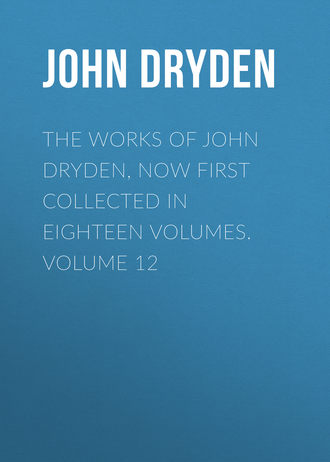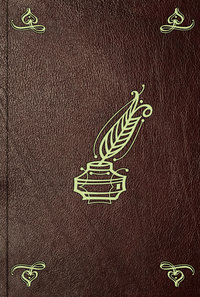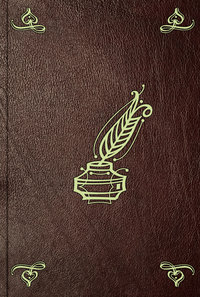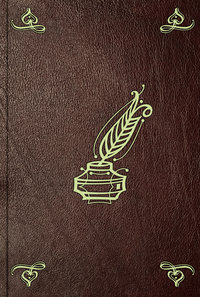 полная версия
полная версияThe Works of John Dryden, now first collected in eighteen volumes. Volume 12
HELEN TO PARIS.
EPIST. XVII. 13
THE ARGUMENTHelen, having received an epistle from Paris, returns the following answer; wherein she seems at first to chide him for his presumption in writing as he had done, which could only proceed from his low opinion of her virtue; then owns herself to be sensible of the passion which he had expressed for her, though she much suspected his constancy; and at last discovers her inclination to be favourable to him; the whole letter shewing the extreme artifice of womankind.
When loose epistles violate chaste eyes,She half consents, who silently denies.How dares a stranger, with designs so vain,Marriage and hospitable rights prophane?Was it for this, your fleet did shelter findFrom swelling seas, and every faithless wind?For though a distant country brought you forth,Your usage here was equal to your worth.Does this deserve to be rewarded so?Did you come here a stranger, or a foe?Your partial judgment may perhaps complain,And think me barbarous for my just disdain;Ill-bred then let me be, but not unchaste,Nor my clear fame with any spot defaced.Though in my face there's no affected frown,Nor in my carriage a feigned niceness shown,I keep my honour still without a stain,Nor has my love made any coxcomb vain.Your boldness I with admiration see;What hope had you to gain a queen like me?Because a hero forced me once away,Am I thought fit to be a second prey?Had I been won, I had deserved your blame,But sure my part was nothing but the shame.Yet the base theft to him no fruit did bear,I 'scaped unhurt by any thing but fear.Rude force might some unwilling kisses gain;But that was all he ever could obtain.You on such terms would ne'er have let me go;Were he like you, we had not parted so.Untouched the youth restored me to my friends,And modest usage made me some amends.'Tis virtue to repent a vicious deed;Did he repent, that Paris might succeed?Sure 'tis some fate that sets me above wrongs,Yet still exposes me to busy tongues.I'll not complain; for who's displeased with love,If it sincere, discreet, and constant prove?But that I fear; not that I think you base,Or doubt the blooming beauties of my face;But all your sex is subject to deceive,And ours, alas! too willing to believe.Yet others yield; and love o'ercomes the best;But why should I not shine above the rest?Fair Leda's story seems at first to beA fit example, ready formed for me.But she was cozened by a borrowed shape,And under harmless feathers felt a rape.If I should yield, what reason could I use?By what mistake the loving crime excuse?Her fault was in her powerful lover lost;But of what Jupiter have I to boast?Though you to heroes and to kings succeed,Our famous race does no addition need;And great alliances but useless prove,To one that comes herself from mighty Jove.Go then, and boast, in some less haughty place,Your Phrygian blood, and Priam's ancient race;Which I would shew I valued, if I durst;You are the fifth from Jove, but I the first.The crown of Troy is powerful, I confess;But I have reason to think ours no less.Your letter, filled with promises of allThat men can good, and women pleasant call,Gives expectation such an ample field,As would move goddesses themselves to yield.But if I e'er offend great Juno's laws,Yourself shall be the dear, the only cause;Either my honour I'll to death maintain,Or follow you, without mean thoughts of gain.Not that so fair a present I despise;We like the gift, when we the giver prize:But 'tis your love moves me, which made you takeSuch pains, and run such hazards for my sake.I have perceived, though I dissembled too,A thousand things that love has made you do.Your eager eyes would almost dazzle mine,In which, wild man, your wanton thoughts would shine.Sometimes you'd sigh, sometimes disordered stand,And with unusual ardour press my hand;Contrive just after me to take the glass,Nor would you let the least occasion pass;When oft I feared, I did not mind alone,And blushing sate for things which you have done;Then murmured to myself, – he'll for my sakeDo any thing; – I hope 'twas no mistake.Oft have I read within this pleasing grove,Under my name, those charming words, – I love.I, frowning, seemed not to believe your flame;But now, alas! am come to write the same.If I were capable to do amiss,I could not but be sensible of this.For oh! your face has such peculiar charms,That who can hold from flying to your arms!But what I ne'er can have without offence,May some blest maid possess with innocence.Pleasure may tempt, but virtue more should move;O learn of me to want the thing you love.What you desire is sought by all mankind;As you have eyes, so others are not blind.Like you they see, like you my charms adore;They wish not less, but you dare venture more.Oh! had you then upon our coasts been brought,My virgin-love when thousand rivals sought,You had I seen, you should have had my voice,Nor could my husband justly blame my choice.For both our hopes, alas! you come too late;Another now is master of my fate.More to my wish I could have lived with you,And yet my present lot can undergo.Cease to solicit a weak woman's will,And urge not her you love to so much ill;But let me live contented as I may,And make not my unspotted fame your prey.Some right you claim, since naked to your eyesThree goddesses disputed beauty's prize;One offered valour, t'other crowns; but sheObtained her cause, who, smiling, promised me.But first I am not of belief so light,To think such nymphs would shew you such a sight;Yet granting this, the other part is feigned;A bribe so mean your sentence had not gained.With partial eyes I should myself regard,To think that Venus made me her reward.I humbly am content with human praise;A Goddess's applause would envy raise.But be it as you say; for, 'tis confest,The men, who flatter highest, please us best.That I suspect it, ought not to displease;For miracles are not believed with ease.One joy I have, that I had Venus' voice;A greater yet, that you confirmed her choice;That proffered laurels, promised sovereignty,Juno and Pallas, you contemned for me.Am I your empire, then, and your renown?What heart of rock, but must by this be won?And yet bear witness, O you Powers above,How rude I am in all the arts of love!My hand is yet untaught to write to men;This is the essay of my unpractised pen.Happy those nymphs, whom use has perfect made!I think all crime, and tremble at a shade.E'en while I write, my fearful conscious eyesLook often back, misdoubting a surprise.For now the rumour spreads among the crowd,At court in whispers, but in town aloud.Dissemble you, whate'er you hear them say; }To leave off loving were your better way; }Yet if you will dissemble it, you may. }Love secretly; the absence of my lordMore freedom gives, but does not all afford;Long is his journey, long will be his stay,Called by affairs of consequence away.To go, or not, when unresolved he stood,I bid him make what swift return he could;Then kissing me, he said, I recommendAll to thy care, but most my Trojan friend.I smiled at what he innocently said,And only answered, "You shall be obeyed."Propitious winds have borne him far from hence,But let not this secure your confidence.Absent he is, yet absent he commands;You know the proverb, "Princes have long hands."My fame's my burden; for the more I'm praised,A juster ground of jealousy is raised.Were I less fair, I might have been more blest;Great beauty through great danger is possest.To leave me here his venture was not hard,Because he thought my virtue was my guard.He feared my face, but trusted to my life;The beauty doubted, but believed the wife.You bid me use the occasion while I can,Put in our hands by the good easy man.I would, and yet I doubt, 'twixt love and fear;One draws me from you, and one brings me near.Our flames are mutual, and my husband's gone;The nights are long; I fear to lie alone.One house contains us, and weak walls divide,And you're too pressing to be long denied.Let me not live, but every thing conspiresTo join our loves, and yet my fear retires.You court with words, when you should force employ;A rape is requisite to shame-faced joy.Indulgent to the wrongs which we receive,Our sex can suffer what we dare not give. —What have I said? for both of us 'twere best,Our kindling fire if each of us supprest.The faith of strangers is too prone to change,And, like themselves, their wandering passions range.Hypsipile, and the fond Minonian14 maid,Were both by trusting of their guests betrayed.How can I doubt that other men deceive,When you yourself did fair Œnone15 leave?But lest I should upbraid your treachery,You make a merit of that crime to me.Yet grant you were to faithful love inclined,Your weary Trojans wait but for a wind;Should you prevail, while I assign the night,Your sails are hoisted, and you take your flight;Some bawling mariner our love destroys,And breaks asunder our unfinished joys.But I with you may leave the Spartan port,To view the Trojan wealth and Priam's court;Shown while I see, I shall expose my fame,And fill a foreign country with my shame.In Asia what reception shall I find?And what dishonour leave in Greece behind?What will your brothers, Priam, Hecuba,And what will all your modest matrons say?E'en you, when on this action you reflect,My future conduct justly may suspect;And whate'er stranger lands upon your coast,Conclude me, by your own example, lost.I from your rage a strumpet's name shall hear,While you forget what part in it you bear.You, my crime's author, will my crime upbraid; —Deep under ground, oh, let me first be laid!You boast the pomp and plenty of your land,And promise all shall be at my command;Your Trojan wealth, believe me, I despise;My own poor native land has dearer ties.Should I be injured on your Phrygian shore,What help of kindred could I there implore?Medea was by Jason's flattery won;I may, like her, believe, and be undone.Plain honest hearts, like mine, suspect no cheat,And love contributes to its own deceit;The ships, about whose sides loud tempests roar,With gentle winds were wafted from the shore.Your teeming mother dreamed, a flaming brand,Sprung from her womb, consumed the Trojan land;To second this, old prophecies conspire,That Ilium shall be burnt with Grecian fire:Both give me fear; nor is it much allayed,That Venus is obliged our loves to aid.For they, who lost their cause, revenge will take;And for one friend two enemies you make.Nor can I doubt, but, should I follow you,The sword would soon our fatal crime pursue.A wrong so great my husband's rage would rouse,And my relations would his cause espouse.You boast your strength and courage; but, alas!Your words receive small credit from your face.Let heroes in the dusty field delight,Those limbs were fashioned for another fight.Bid Hector sally from the walls of Troy;A sweeter quarrel should your arms employ.Yet fears like these should not my mind perplex,Were I as wise as many of my sex;But time and you may bolder thoughts inspire,And I, perhaps, may yield to your desire.You last demand a private conference;These are your words, but I can guess your sense.Your unripe hopes their harvest must attend;Be ruled by me, and time may be your friend.This is enough to let you understand;For now my pen has tired my tender hand.My woman knows the secret of my heart,And may hereafter better news impart.DIDO TO ÆNEAS.
EPIST. VII
THE ARGUMENTÆneas, the son of Venus and Anchises, having, at the destruction of Troy, saved his Gods, his father, and son Ascanius, from the fire, put to sea with twenty sail of ships; and, having been long tost with tempests, was at last cast upon the shore of Libya, where queen Dido (flying from the cruelty of Pygmalion, her brother, who had killed her husband Sichæus) had lately built Carthage. She entertained Æneas and his fleet with great civility, fell passionately in love with him, and in the end denied him not the last favours. But Mercury admonishing Æneas to go in search of Italy, (a kingdom promised him by the Gods,) he readily prepared to follow him. Dido soon perceived it, and, having in vain tried all other means to engage him to stay, at last, in despair, writes to him as follows.
So, on Mæander's banks, when death is nigh,The mournful swan sings her own elegy.Not that I hope (for, oh, that hope were vain!)By words your lost affection to regain;But, having lost whate'er was worth my care,Why should I fear to lose a dying prayer?'Tis then resolved poor Dido must be left,Of life, of honour, and of love bereft!While you, with loosened sails, and vows, prepareTo seek a land that flies the searcher's care;Nor can my rising towers your flight restrain,Nor my new empire, offered you in vain.Built walls you shun, unbuilt you seek; that landIs yet to conquer, but you this command.Suppose you landed where your wish designed,Think what reception foreigners would find.What people is so void of common sense,To vote succession from a native prince?Yet there new sceptres and new loves you seek,New vows to plight, and plighted vows to break.When will your towers the height of Carthage know?Or when your eyes discern such crowds below?If such a town and subjects you could see,Still would you want a wife who loved like me.For, oh, I burn, like fires with incense bright;Not holy tapers flame with purer light.Æneas is my thoughts' perpetual theme,Their daily longing, and their nightly dream.Yet he's ungrateful and obdurate still;Fool that I am to place my heart so ill!Myself I cannot to myself restore;Still I complain, and still I love him more.Have pity, Cupid, on my bleeding heart,And pierce thy brother's with an equal dart.I rave; nor canst thou Venus' offspring be,Love's mother could not bear a son like thee.From hardened oak, or from a rock's cold womb,At least thou art from some fierce tigress come;Or on rough seas, from their foundation torn,Got by the winds, and in a tempest born:Like that, which now thy trembling sailors fear;Like that, whose rage should still detain thee here.Behold how high the foamy billows ride!The winds and waves are on the juster side.To winter weather, and a stormy sea,I'll owe what rather I would owe to thee.Death thou deserv'st from heaven's avenging laws;But I'm unwilling to become the cause.To shun my love, if thou wilt seek thy fate,'Tis a dear purchase, and a costly hate.Stay but a little, till the tempest cease,And the loud winds are lulled into a peace.May all thy rage, like theirs, inconstant prove!And so it will, if there be power in love.Know'st thou not yet what dangers ships sustain?So often wrecked, how darest thou tempt the main?Which were it smooth, were every wave asleep,Ten thousand forms of death are in the deep.In that abyss the gods their vengeance store,For broken vows of those who falsely swore;There winged storms on sea-born Venus wait,To vindicate the justice of her state.Thus I to thee the means of safety show;And, lost myself, would still preserve my foe.False as thou art, I not thy death design;O rather live, to be the cause of mine!Should some avenging storm thy vessel tear,(But heaven forbid my words should omen bear!)Then in thy face thy perjured vows would fly,And my wronged ghost be present to thy eye;With threatening looks think thou behold'st me stare,Gasping my mouth, and clotted all my hair.Then, should forked lightning and red thunder fall,What couldst thou say, but, I deserved them all?Lest this should happen, make not haste away;To shun the danger will be worth thy stay.Have pity on thy son, if not on me;My death alone is guilt enough for thee.What has his youth, what have thy gods deserved,To sink in seas, who were from fires preserved?But neither gods nor parent didst thou bear;Smooth stories all, to please a woman's ear,False as the tale of thy romantic life.Nor yet am I thy first-deluded wife;Left to pursuing foes Creusa stayed,By thee, base man, forsaken and betrayed.This, when thou told'st me, struck my tender heart,16That such requital followed such desert.Nor doubt I but the gods, for crimes like these,Seven winters kept thee wandering on the seas.Thy starved companions, cast ashore, I fed,Thyself admitted to my crown and bed.To harbour strangers, succour the distrest,Was kind enough; but, oh, too kind the rest!Curst be the cave which first my ruin brought,Where, from the storm, we common shelter sought!A dreadful howling echoed round the place;The mountain nymphs, thought I, my nuptials grace.I thought so then, but now too late I knowThe furies yelled my funerals from below.O chastity and violated fame,Exact your dues to my dead husband's name!By death redeem my reputation lost,And to his arms restore my guilty ghost!Close by my palace, in a gloomy grove,Is raised a chapel to my murdered love;There, wreathed with boughs and wool, his statue stands,The pious monument of artful hands.Last night, methought, he called me from the dome,And thrice, with hollow voice, cried, Dido, come! —She comes; thy wife thy lawful summons hears,But comes more slowly, clogged with conscious fears.Forgive the wrong I offered to thy bed;Strong were his charms, who my weak faith misled.His goddess mother, and his aged sireBorne on his back, did to my fall conspire.Oh! such he was, and is, that, were he true,Without a blush I might his love pursue;But cruel stars my birth-day did attend,And, as my fortune opened, it must end.My plighted lord was at the altar slain,Whose wealth was made my bloody brother's gain;Friendless, and followed by the murderer's hate,To foreign countries I removed my fate;And here, a suppliant, from the natives' handsI bought the ground on which my city stands,With all the coast that stretches to the sea,E'en to the friendly port that sheltered thee;Then raised these walls, which mount into the air,At once my neighbours' wonder, and their fear.For now they arm; and round me leagues are made,My scarce established empire to invade.To man my new-built walls I must prepare,An helpless woman, and unskilled in war.Yet thousand rivals to my love pretend,And for my person would my crown defend;Whose jarring votes in one complaint agree,That each unjustly is disdained for thee.To proud Hyarbas give me up a prey,For that must follow, if thou goest away;Or to my husband's murderer leave my life,That to the husband he may add the wife.Go then, since no complaints can move thy mind;Go, perjured man, but leave thy gods behind.Touch not those gods, by whom thou art forsworn,Who will in impious hands no more be borne;Thy sacrilegious worship they disdain,And rather would the Grecian fires sustain.Perhaps my greatest shame is still to come,And part of thee lies hid within my womb;The babe unborn must perish by thy hate,And perish, guiltless, in his mother's fate.Some god, thou sayest, thy voyage does command;Would the same god had barred thee from my land!The same, I doubt not, thy departure steers,Who kept thee out at sea so many years;While thy long labours were a price so great,As thou, to purchase Troy, would'st not repeat.But Tyber now thou seek'st, to be at best,When there arrived, a poor precarious guest.Yet it deludes thy search; perhaps it willTo thy old age lie undiscovered still.A ready crown and wealth in dower I bring,And, without conquering, here thou art a king.Here thou to Carthage may'st transfer thy Troy;Here young Ascanius may his arms employ;And, while we live secure in soft repose,Bring many laurels home from conquered foes.By Cupid's arrows, I adjure thee stay!By all the gods, companions of thy way!So may thy Trojans, who are yet alive,Live still, and with no future fortune strive;So may thy youthful son old age attain,And thy dead father's bones in peace remain;As thou hast pity on unhappy me,Who knew no crime, but too much love of thee.I am not born from fierce Achilles' line,Nor did my parents against Troy combine.To be thy wife if I unworthy prove,By some inferior name admit my love.To be secured of still possessing thee,What would I do, and what would I not be!Our Libyan coasts their certain seasons know,When, free from tempests, passengers may go;But now with northern blasts the billows roar,And drive the floating sea-weed to the shore.Leave to my care the time to sail away;When safe, I will not suffer thee to stay.Thy weary men would be with ease content;Their sails are tattered, and their masts are spent.If by no merit I thy mind can move,What thou deniest my merit, give my love.Stay, till I learn my loss to undergo,And give me time to struggle with my woe:If not, know this, I will not suffer long;My life's too loathsome, and my love too strong.Death holds my pen, and dictates what I say,While cross my lap the Trojan sword I lay.My tears flow down; the sharp edge cuts their flood,And drinks my sorrows, that must drink my blood.How well thy gift does with my fate agree!My funeral pomp is cheaply made by thee.To no new wounds my bosom I display;The sword but enters where love made the way.But thou, dear sister, and yet dearer friend,Shalt my cold ashes to their urn attend.Sichæus' wife let not the marble boast;I lost that title, when my fame I lost.This short inscription only let it bear;"Unhappy Dido lies in quiet here."The cause of death, and sword by which she died,"Æneas gave; the rest her arm supplied."TRANSLATIONS FROM OVID'S METAMORPHOSES
DEDICATION PREFIXED TO THE TRANSLATIONS FROM OVID's METAMORPHOSES
This Dedication contains abundance of literary and political controversy. The first heat of the Revolution had been long over, and the losers began to assume the privilege of talking, without fear that an established government would think their complaints worthy of much notice. Dryden, whom the evils of degradation and poverty pressed severely, was not of a temper to remain silent under them, as soon as he conceived it safe to utter his grievances. In losing his places of laureat and historiographer, there was not only dishonour, but great pecuniary loss; nor was it at all a soothing addition, that his old enemy Shadwell had obtained the one, and his equivocal friend Rymer the other, of his appointments. He sets out in extremely bad humour with the government, under which he had suffered this deprivation; with those who had risen by his fall; and with himself, for having cultivated the barren field of poetry, instead of aspiring to the honours of the gown. At length, after having ventured probably as far as he thought safe, certainly as far as to excite displeasure, in flourishes of declamation, which, though expressed against ministers in general, are obviously levelled against those of the day, he turns short, and falls with great vehemence upon the whole body of critics, ancient and modern, as the natural enemies of poets and poetry. Descending to those of his own day, he singles out Rymer, who, in a piece, called, "A short View of Tragedy," published in 1692, had depreciated the modern drama in his deep admiration of the ancients. The controversy concerning the comparative merits of the ancients and moderns was now raging in the literary world. Perault had written his "Parallel," and Sir William Temple his "Essay on Ancient and Modern Learning." Wotton's "Reflections" were published in 1694, and these led the way to Swift's "Battle of the Books," in which our author is treated with great severity.
Rymer had not only espoused the cause of the ancient tragedians in the general dispute, but, as Dryden complains, had treated him slightly; and our bard was not famous for patience under such offences. He therefore retorts in this Dedication, maliciously upbraids Rymer with the fate of his fallen tragedy "Edgar;" and artfully divides the comparison between the Grecian and British dramatists, from that which Perault had instituted between the ancient poets in general and those of modern France. Our author's good taste, as well as policy, led him to take a distinction so necessary for the maintenance of his cause. Having bestowed what he thought an adequate chastisement upon Rymer, he employs the small remainder of the preface in discussing a few miscellaneous points of criticism, chiefly relating to translation.
The tone of this Dedication excited, as Dryden himself informs us, the resentment of the court, who employed Rymer to attack our author's dramatic reputation; a task which he never accomplished.17
DEDICATION OF THE THIRD MISCELLANY, 1693, CONTAINING TRANSLATIONS FROM OVID'S METAMORPHOSES
TO THE RIGHT HONOURABLE LORD RADCLIFFE. 18MY LORD,
These Miscellany Poems are by many titles yours. The first they claim, from your acceptance of my promise to present them to you, before some of them were yet in being. The rest are derived from your own merit, the exactness of your judgment in poetry, and the candour of your nature; easy to forgive some trivial faults, when they come accompanied with countervailing beauties. But, after all, though these are your equitable claims to a dedication from other poets, yet I must acknowledge a bribe in the case, which is your particular liking of my verses.







